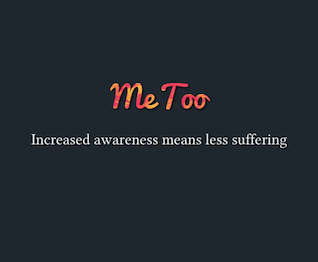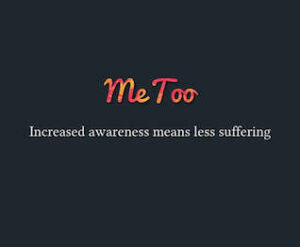Me Too

 If you have spent time on social media over the last week or so, I know you’ve seen the Me Too posts that are an attempt to make the public more aware of the millions of women and girls who have been and are currently being sexually assaulted, harassed and abused. Rightfully so as another case of sexual harassment and assault against women has come to light via the national news. If you want to know more about Me Too, click here.
If you have spent time on social media over the last week or so, I know you’ve seen the Me Too posts that are an attempt to make the public more aware of the millions of women and girls who have been and are currently being sexually assaulted, harassed and abused. Rightfully so as another case of sexual harassment and assault against women has come to light via the national news. If you want to know more about Me Too, click here.
Our country has a problem understanding sexual assault, how it affects individuals, and many have a problem reporting the perpetrator when they are assaulted. Our laws make it very hard to convict sexual crimes putting the victim at risk of revictimization by the court system and the perpetrator.
Anyone who has ever been sexually assaulted, harassed, or abused knows all too well that it is a very laborious recovery. Even if you are in denial of what happened to you, and you feel you’ve successfully moved on with your life – your life is greatly changed by the sexual abuse – it has unconsciously governed many of your decisions. How many times has a victim heard, “Just move on” or “Get your life together, it just isn’t that bad”.
Most therapists will tell you that many of their clients are women and girls. Our American culture makes it much easier for women to seek therapeutic support and more challenging for a man to reach out for help. Many of us continue to teach little boys not to cry, to handle their problems like a man, and many adult men continue these ideas into adulthood believing they have to be “the strength” of their family. Asking for help seems weak when we feel we have a duty to be strong. When a man does seek help for sexual abuse, assault, or harassment, it is a troubling issue that has bubbled over into daily life in a way that he is no longer able to tolerate.
I’d say that over 90% of the women who come into therapy in my practice have some history of sexual assault, with some of them experiencing long term sexual abuse from a family member, a family friend, or a neighbor. Many of them told a parent about their abuse, and even when believed, were asked to keep the situation quiet or forced to continue normal family relationships, including visiting the relative that assaulted them. This parental decision causes more trauma for the child.
Most of the men that have arrived at my office for sexual abuse counseling have been molested by a male athletic coach, have experienced male to male sexual molestation and abuse by a family member or a family friend, or sought help because of incest by a family member. But when men do reach out for therapy, many pay cash for treatment instead of using their insurance fearing their employer will find out and they will be less effective at work – be overlooked for a promotion – or lose their job. While most women are willing to work on their issues as long as it takes, many men limit their time in therapy feeling “less than” if they are not recovered after a month or two of appointments. Our culture does not support male victims of abuse or even want to discuss male sexual abuse. Our little boys and our teenaged young men need our support as much as our girls.
I’d like to share the handouts that I give to parents who suspect their child has been sexually abused and to adult clients who come for therapy not really knowing that their experience is sexual abuse. But before I do that I’d like to discuss sexual abuse and define it in detail, because many of us don’t know.
Sexual assault is any type of sexual behavior that occurs without the explicit consent of the recipient. Falling under the definition of sexual assault are sexual activities as forced sexual intercourse, forcible sodomy, child molestation, incest, fondling, and attempted rape. – June 16, 2017 US Department of Justice
It is important to know that you don’t have to have been raped, groped, or have your genitals fondled by your assailant to have suffered sexual abuse. There is active abuse (touching and threatening) and passive abuse which is attitudinal and subtle and possibly unintentional. The following are samples of some of the stories that clients report as being abusive or feeling like abuse. Children simply know that certain circumstances feel uncomfortable or frightening and they don’t want to experience it anymore. The scenarios I’m sharing give you an idea of the wide spectrum of experiences that are reported by men and women in therapy for treatment of childhood sexual abuse. None of these statements are a breach of confidentiality and are an amalgam of hundreds of thoughts and statements.
Repeated threats of sexual assault that terrify the child. (If you do that again, I’m going to …)
Knowing that someone is watching through a window or partially open door as you are dressing, undressing, or bathing. Having a house rule that prohibits a closed bedroom door.
A young child or adolescent watching pornographic movies or videos with a parent or both parents
Bringing a child into your bed when you are naked or into the shower after a child becomes aware of their personal body parts and that of their parents can easily be remembered as sexually offensive, emotionally disturbing, or abusive.
A parent demanding to bathe an elementary-aged child, washing private parts by hand or with a wash cloth is often experienced as sexual abuse.
Teaching a child to be sexually afraid of men or women or telling stories of men or women molesting children can easily cross the line into sexual abuse. (This does not refer to teaching child safety)
Teaching young children about sex before they are ready can frighten them, creating a memory that imprints as sexual abuse – especially if the child is sexually awakened during these conversations.
Allowing children to be present in the room during sexual contact between parents is experienced as sexual abuse.
A child who has listened to sexually explicit jokes since toddlerhood, may feel he or she has been sexually abused even though a parent has never touched them inappropriately.
Forcing enemas that involve parental manipulation of private areas of the child’s body.
Over the years my clients have found these downloadable handouts to be very helpful in understanding sexual abuse and its impact on their lives or on their child’s life.
If you suspect that you were sexually abused or suspect that your child has been molested or abused, please take action. If you suspect your child is currently experiencing sexual abuse from a family member, someone you know, or from someone at school or through a social organization, please reach out to help the child. Report the perpetrator to the proper authorities or a professional who knows how to help.
Many runaways are sexual abuse victims and need our help. Many children and teens are victims of human trafficking – sold into the sex trade market. They need our awareness and our help – they are victims and suffering.
Handouts: The handouts are free and do not require that you join the page or leave contact information. You may leave your contact information if you wish to receive Janet’s blog posts. Be sure to download and print both handouts.
If you left your email, you will be asked to confirm it for our records.

